Flexible and resilient thinking is all about problem-solving our inevitable struggles. I’m sharing my efforts to find solutions to my struggles in case any other SLPs find them helpful.
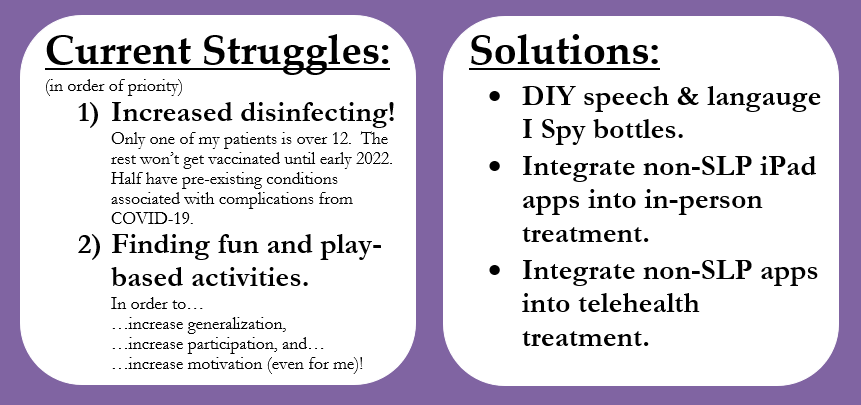
August’s Target: Irregular Past-Tense Verbs
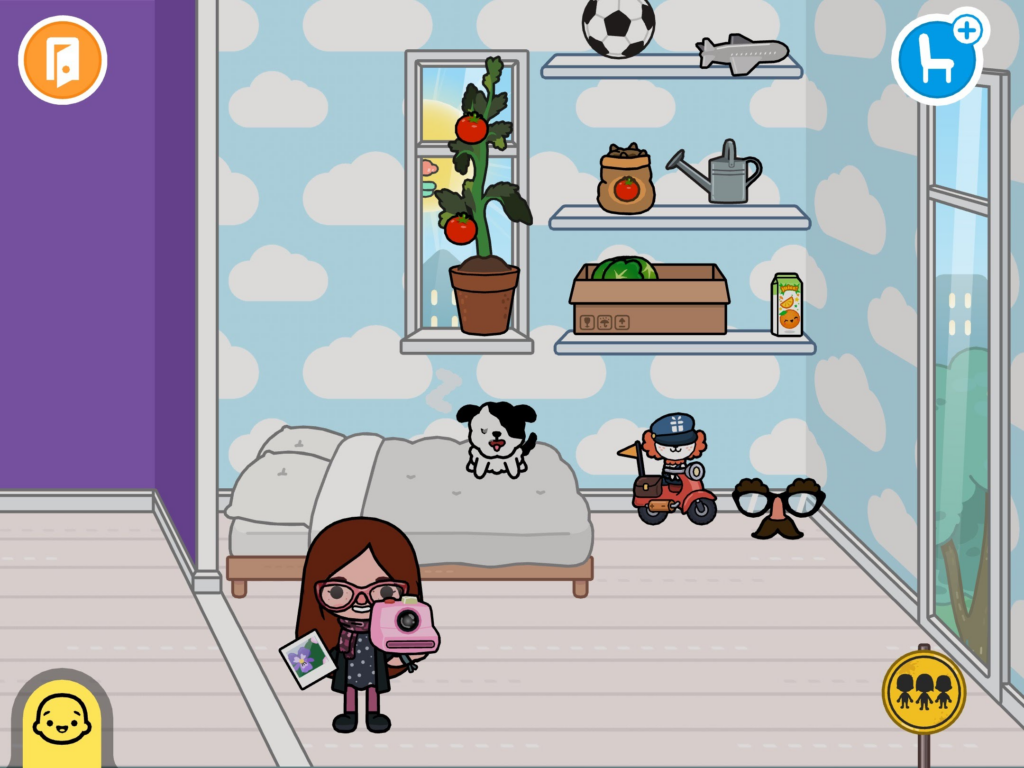
One of my biggest challenges has been finding play-based activities that work for telehealth. The best solution I’ve found so far is using the app from developers Toca Boca called Toca Life World. In Toca Life World I’ve set up various rooms for targeting various speech and language skills. Here’s my tutorial on how to use Toca Life World to target irregular past-tense verbs.
August’s I Spy Bottle Theme: Ocean
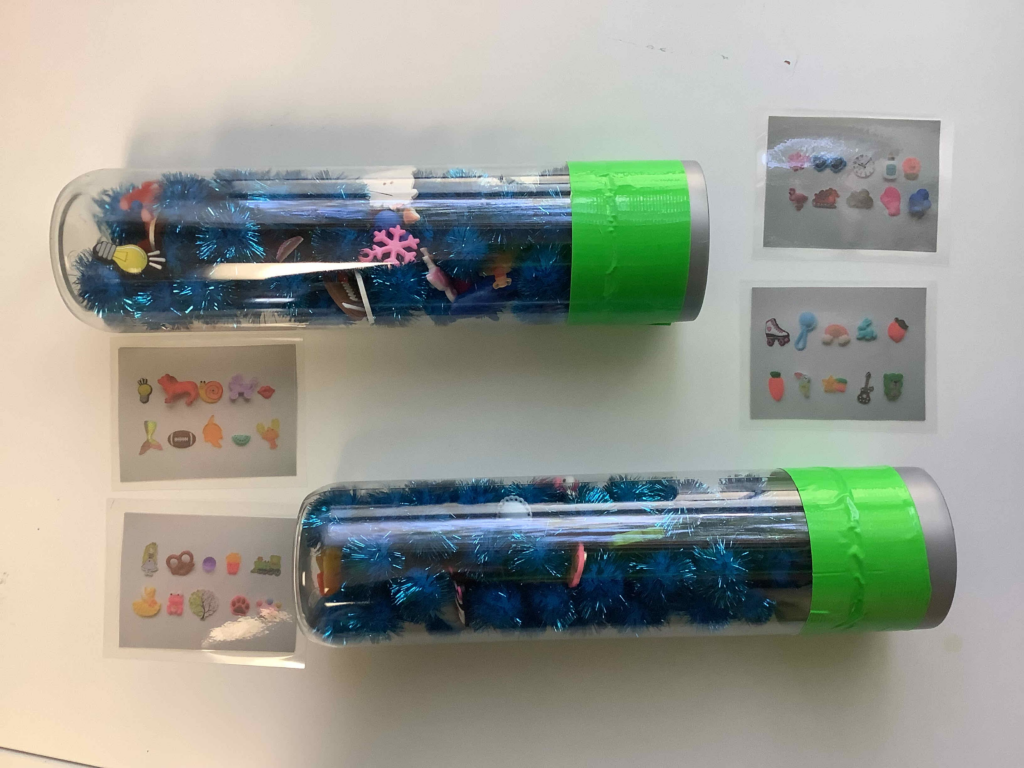
To cut back on disinfecting without cutting back on play-based activities I made my own I Spy bottles, which are based on the game “Find It”. I bought the 850 ml Voss water bottles because they have the biggest opening I could find and I bought a “chunky” filling (this month it was blue tinsel pom-poms for an ocean theme). I then added articulation minis (since most of my in-person patients are currently working on /r/, /r/-blends /l/ and /l/-blends that’s what I added), and an ocean animal in each bottle. During the appointment I give my patient one bottle, let him/her find the minis inside (and worked on their pronunciation for the patients who needed it) while I look for the minis inside another bottle and we count how many we each found. Then I target the following irregular past-tense verbs with these phrases:
- Found – I say, “You were looking and then you were finding and finding – what did you do?” If that doesn’t work then I can add in “Is it ‘finded‘?” And for the most help I can ask, “Is it ‘finded‘ or ‘found‘?”
- Saw – I say, “Can you see the fish?” then “What did we do with the fish?”
- Got – I say, “You’re looking and getting points for each one you find” then “What happened when you found something?”
- Swam – I say, “You were turning the bottle and it looked like the fish was swimming” then “It looked like the fish did what?”
- Put – “To make these bottles I poured in the pom-poms and then what?”
- Ate – “Let’s pretend the fish was swimming and then found food so he was eating and eating and eating” then “What did he do with the food?”
- Won – “You found # of things in your bottle and I found # of things in my bottle so you…”
- Lost – (see “won” above)
August’s App: Toca Kitchen Monsters
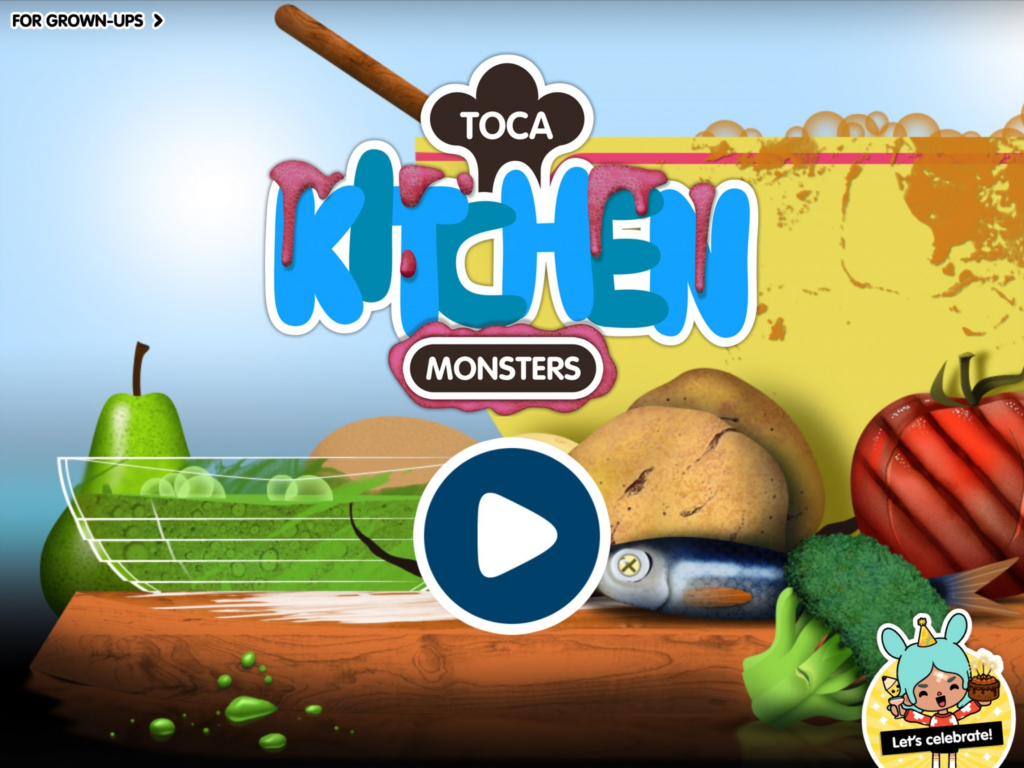
This is another app from Toca Boca. In this one we get to choose a monster, choose different ingredients, and try to prepare food that the monsters will eat. While my patients are playing it (or I’m playing it for them online) I can target the following irregular past-tense verbs:
- Chose – the kids get to choose the brown or blue monster, then I can ask them, “What did we do first? Is it ‘we choosed‘?”
- Got – the kids take ingredients out of the refrigerator (found by swiping the left edge of the screen to the right) and then I can ask them, “What did we do next? Is it ‘we gotted food’?”
- Took – I target this the same way as “got” so I ask, “What did we do with the food? Is it ‘we taked it from the fridge’?”
- Put – the kids put the ingredients on the monster’s plate then I can ask, “What did we do with the food? Did we ‘putted‘ it on the plate?”
- Ate – the kids can pull the food up to the monster’s mouth and if he eats it then I can ask, “What did he do with the food? Is it ‘he eated it’?”
- Blew – When the monster won’t eat the food he’ll blow a raspberry at it. The brown monster will do this with the tomato, lemon, and raw steak and the blue monster will do this with the broccoli. After this happens I ask, “What did he do? Is it ‘he blowed a raspberry’?” Sometimes I’ll have to explain what a “raspberry” is in this context, but kids usually understand what I’m talking about the second time around.
- Let – When you try to feed the brown monster a raw tomato and the blue monster raw broccoli they let the food fall off the table and onto the ground (where we can’t see or retrieve it). For this I’ll tell the kids, “It was rolling off the table and he didn’t even stop it – what did he do? Is it ‘he letted it fall’?”
- Fell – After the food falls I can also ask, “The food was falling off the table and now it’s all done. What did it do? Did it ‘falled’?”
- Made – after we prepare the food with the kitchen tools (found by swiping the right edge of the screen to the left) I can ask, “What did we do with the food? Is it ‘we maded it’?”
- Cut – after using the cutting board to cut the food into pieces I ask, “What did we do with the knife? Did we ‘cutted’?”
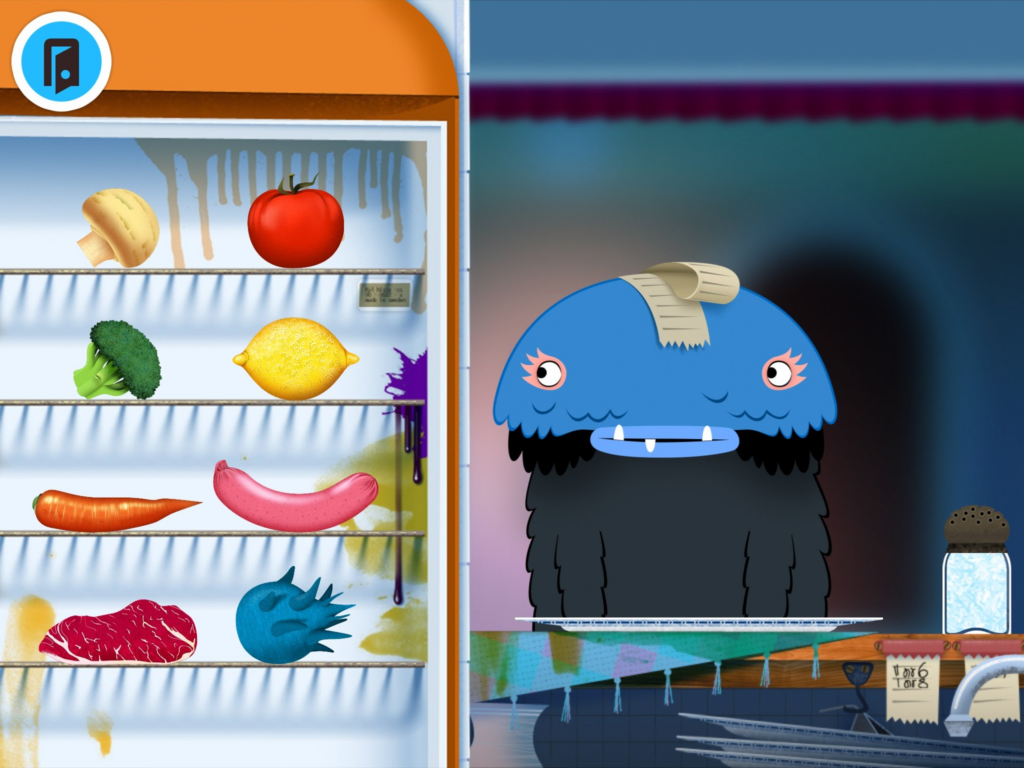
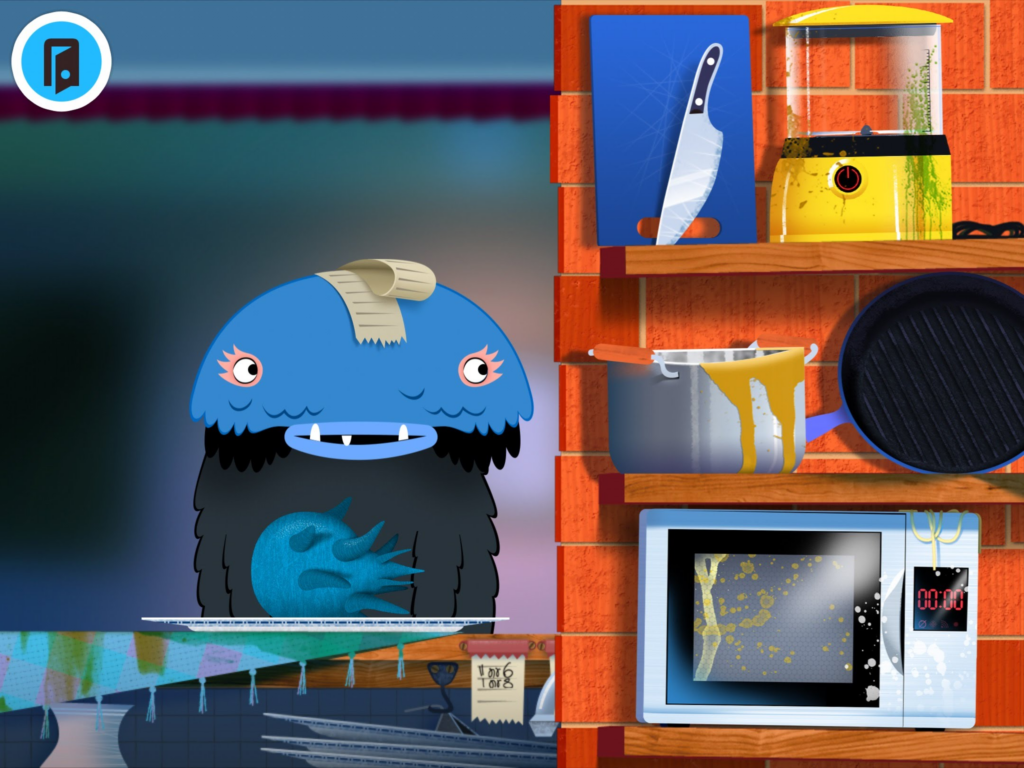
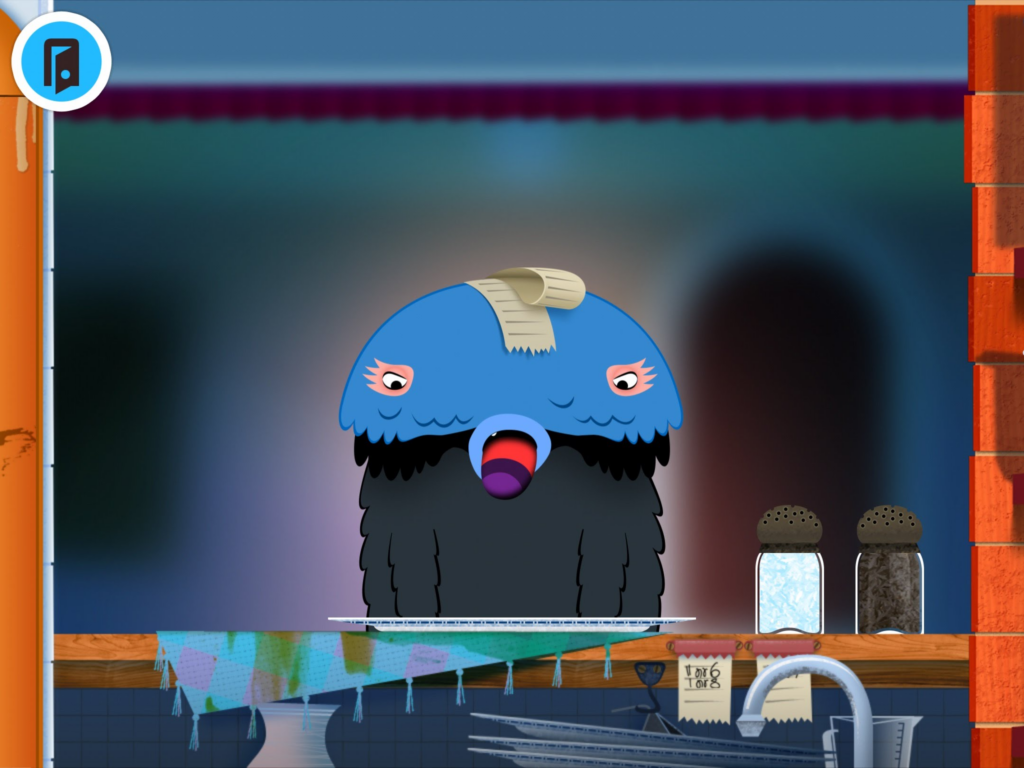
Next month I’ll write about how to target social skills with Toca Life World, another app, and I Spy bottles.
